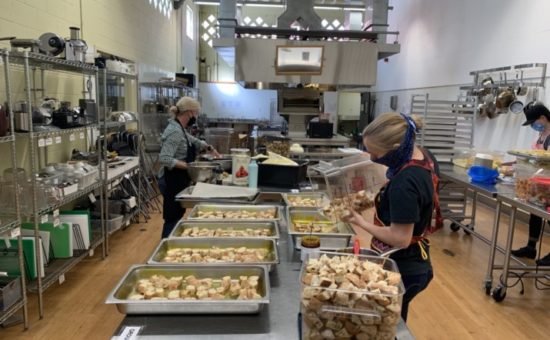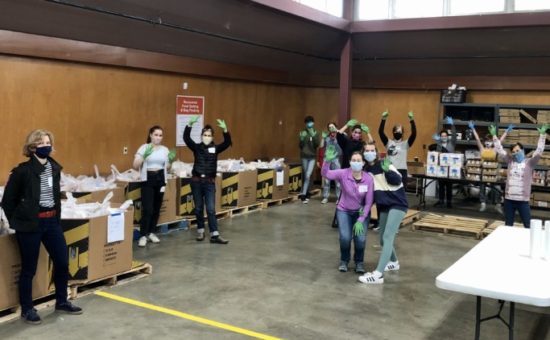
Berkeley Food Network Finds COVID “Silver Lining”
Berkeley, CA. Berkeley Food Network, a middleman between large food sources – such as food banks or markets –and community distributors, has more than tripled its community impact in just two months. According to the nonprofit’s Executive Director Sara Webber, “With COVID we went in two months… from serving 1,600 people a week to 5,000 people a week.”
When it was founded in 2016 by Sara Webber, Dona Boatright, Chuck Fanning, and Kate Campbell King, the Berkeley Food Network worked it’s way up to serving around 300 food-insecure people. In two years, thanks to partnerships with community organizations like Head Start, senior and medical centers, as well as the Alameda County Food Bank, that number grew to 1,600. But the Coronavirus outbreak and California’s shelter-in-place order “completely changed our operations,” Webber notes. “We’re saying it’s our silver lining.” And indeed, the pandemic has given people who may be reluctant to ask for free food the push they need to accept help.

Berkeley Food Network employees pose for a photo pre-COVID-19.
An essential part of the Berkeley Food Network’s model is destigmatizing food handouts. At the nonprofit’s farmer market-style pantries, staff shop alongside food insecure people, taking just a few items. The goal of this is to normalize free food, and the strategy works; customers feel more comfortable and participate more. Since the shelter-in-place order, the Food Network has shifted from running pop-up pantries at convenient times and locations for families to delivering pre-packed grocery bags to community partners. One such partner is Headstart, a preschool for low-income children that is run by the YMCA. Once a month the Berkeley Food Network sets up a food pantry at Headstart from three to five in the afternoon, so parents can easily access free food while they are picking their kids up. Although Headstart was forced to suspend its program due to COVID, BFN has found numerous new community partners.

A mother and daughter pick food from a BFN pop-up pantry prior to the onset of the pandemic.
Despite the many organizations devoted to feeding the hungry in and around Berkeley, “There are a lot of people falling through the holes,” according to Webber. That is where BFN comes in. They work with partner organizations in the community to get food where it is most needed. Research by the Food Network shows that 24,000 Berkeley residents were food insecure pre-COVID-19. However, only 6,000 of them had access to regular food assistance. It is the Berkeley Food Network’s mission to close that gap by developing strong and collaborative community partnerships to reach each of those 24,000 people with healthy food.

Masked BFN workers sort food to be distributed to families.
Healthy food is a hallmark of Berkeley Food Network. They never distribute sugary drinks or foods – most of their produce is sourced from hyper-organic community gardens like King Middle School’s Edible Schoolyard and Urban Adamah. In addition, BFN receives donations from personal organic gardens. To fill in the cracks, BFN’s food recovery program sources food from local businesses that would normally throw away imperfect, but perfectly healthy, produce. Packages typically contain food for an entire family to eat three meals.

BFN warehouse workers pose for a masked photo.
If you are interested in getting involved with Berkeley Food Network:
From Berkeley Food Network: Did you know that 1 in 5 Berkeley residents are not able to put enough food on their tables to live healthy, hunger-free lives? The Berkeley Food Network was founded in December 2016 with the goal of ending hunger in Berkeley. We have an innovative mix of community-centered and collaborative programs to get healthy, nutritious food to the people in Berkeley who need it. At the heart of this work is our food sourcing and distribution hub operating out of our warehouse. We source food from the Alameda County Community Food Bank and local food businesses that is later distributed to Berkeley residents. The graphic below outlines specifically how our community-centered approach operates to end hunger in Berkeley.




